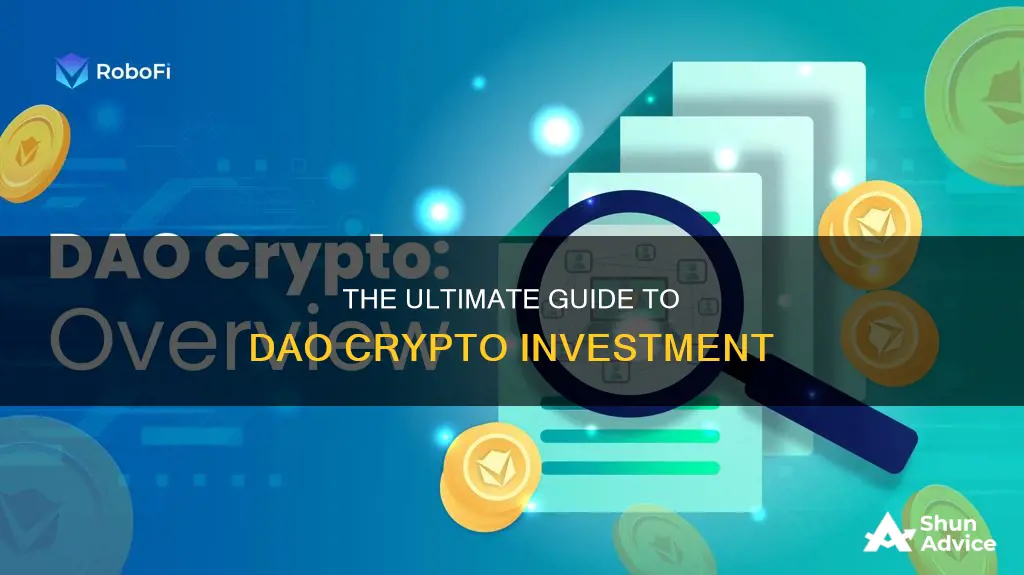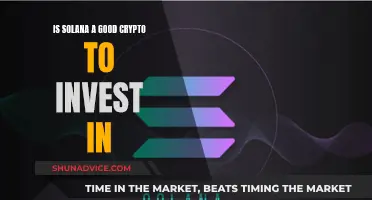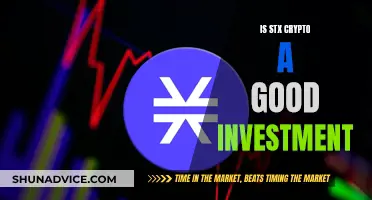
Decentralized Autonomous Organizations (DAOs) are a type of organizational structure with no central governing body. Instead, power is distributed among token holders who collectively cast votes. Decisions are made using a bottom-up management approach, with all votes and activities posted on a blockchain. DAOs were popularized by blockchain enthusiasts and the first DAOs were created by developers to automate decisions and facilitate cryptocurrency transactions. One of the most well-known examples of a DAO is The DAO, which was launched in 2016 and became one of the largest crowdfunding campaigns in history. However, it ceased activity after a hack that resulted in the loss of a significant portion of its funds. Despite this setback, DAOs continue to be of interest to investors due to their potential benefits, including increased decentralization, participation, publicity, and community.
| Characteristics | Values |
|---|---|
| Type of Organisation | Decentralized Autonomous Organization (DAO) |
| Structure | No central governing body; token holders participate in management and decision-making |
| Decision-Making | Bottom-up management approach; voting system based on the number of tokens held |
| Security | High risk of being hacked; requires significant technical expertise to implement |
| Speed | Slower decision-making process due to the need for voting |
| Education | Responsibility to educate members on pending activities and strategies |
| Flexibility | Supports innovative proposals, including those with no promise of return |
| Profitability and Growth | Charges for products or services, with revenue sent directly to the DAO in ETH |
| Governance | Autonomous; token holders can vote on important decisions |
| Funding | Initial Coin Offering (ICO); crowdfunding |
| Purpose | To provide a decentralized business model for commercial and non-profit enterprises |
What You'll Learn

DAO's structure and function
Decentralized Autonomous Organizations (DAOs) are a new way of structuring and managing groups without centralized control or traditional leadership. They are a type of bottom-up entity structure with no central authority. Instead, DAOs rely on smart contracts and group voting to make decisions together and openly.
DAOs emerged as a concept in 2016, inspired by the decentralization of cryptocurrencies. The idea is to promote oversight and management of an entity similar to a corporation, but without a central authority. The collective group of leaders and participants acts as the governing body, with each member having a direct say and voting power on all matters.
The structure of a DAO is typically based on blockchain technology, which ensures transparency and security. All votes and activities through the DAO are posted on a blockchain, making all actions of users viewable. This also allows for global participation, as physical meetings are not required.
To be fully functional, a DAO needs a set of rules to operate by, funding in the form of tokens, and a secure structure that allows every investor to configure the organization. The funding of DAOs is mainly based on crowdfunding that issues tokens.
One of the first and most well-known examples of a DAO is "The DAO", which was launched in 2016 as a venture capital fund based on open-source code without a typical management structure or board of directors. The DAO raised over $150 million in a crowdfunding campaign, making it the largest crowdfunding campaign ever recorded at the time. However, it also faced security issues and was eventually hacked, losing $50 million worth of Ethereum.
Despite this setback, DAOs have continued to gain popularity and are now used for various purposes such as investment, charity, fundraising, borrowing, or buying NFTs. They offer a novel approach to global resource management and collaboration, providing a more democratic and efficient way for groups to achieve their goals.
The Ultimate Guide to Investing in Bitcoin in India
You may want to see also

DAO's benefits and risks
Decentralized Autonomous Organizations (DAOs) are communities of individuals united by a common goal, collaborating and making decisions in a decentralized and transparent manner. They are characterized by a lack of central authority, with power distributed among token holders who collectively cast votes. This bottom-up management approach promotes inclusivity and equal voting rights, allowing every member to have a say in the decision-making process.
Benefits of DAOs:
- Enhanced collaboration and streamlined decision-making: DAOs promote quick consensus-building through innovative voting mechanisms, reducing bureaucracy and hierarchy.
- Inclusive participation: DAOs provide accessible entry for all contributors, regardless of their position, experience, or qualifications. They encourage diversity and value the unique perspective and skills of each participant.
- Decentralization and transparency: DAOs eliminate central authorities, removing single points of failure and reducing the risk of corruption and manipulation. They leverage blockchain technology for immutable and transparent record-keeping, fostering trust and accountability.
- Empowering innovation: DAOs provide access to global talent and resources, enabling borderless collaboration and the pooling of diverse expertise and skill sets. They offer rapid and efficient funding mechanisms through tokenization, increasing liquidity and reducing barriers to investment.
- Community ownership and governance: DAOs align the interests of contributors and stakeholders, fostering a sense of shared ownership and responsibility. They incentivize active participation and contribution, mitigate power asymmetry, and ensure democratically determined rules and policies.
- Global accessibility: DAOs transcend geographical boundaries and are often associated with a lower barrier to entry, making them accessible to individuals from all over the world.
- Encouraging non-profit organizations: DAOs offer automated efficiency, transparency, and a lack of central authority, which are advantageous for non-profit organizations. They enable crowdfunding based on trust and transparency, minimizing the risk of stolen funds.
Risks of DAOs:
- Decision-making process: With a large number of participants, coordinating decisions can be challenging and time-consuming, potentially slowing down the development of the DAO.
- Legal and regulatory considerations: DAOs operate in a grey area of legality and must navigate evolving regulatory frameworks to ensure compliance with securities regulations, anti-money laundering requirements, and tax obligations.
- Security: DAOs are vulnerable to exploits and attacks, and proper security measures must be implemented to protect treasury reserves and user funds.
- Inefficiency: The nature of DAOs, with their diverse range of participants, can lead to inefficiencies in educating voters, communicating initiatives, and onboarding new members.
- Personal liability: By law, DAOs are presumed to be general partnerships, exposing their members to potential personal liability for the actions and debts of the DAO.
The Ultimate Guide: Getting Started with Bitcoin
You may want to see also

DAO's history and future
DAOs: History and Future
The concept of a Decentralized Autonomous Organization (DAO) was first introduced in the 1990s to describe the multi-agent system of the Internet of Things (IoT). However, the idea of a decentralized autonomous company (DAC) with a governance model using tokenized shares to generate yields for shareholders emerged in early crypto forums. The term "DAO" was coined by Vitalik Buterin in 2013, although he credits Daniel Suarez's science fiction novel "Daemon" as an influence.
The Bitcoin network, created by Satoshi Nakamoto in 2009, is considered the first example of a DAO. The first DAO in the modern sense, "The DAO", was launched in the Ethereum community in May 2016. It was a decentralized venture capital fund or crowdfunding platform that allowed entrepreneurs to pitch their business plans to the community in exchange for funding. "The DAO" raised approximately $150 million from around 11,000-20,000 investors but was soon hacked, resulting in the loss of $50 million worth of Ethereum. This incident caused a split in the Ethereum community and led to the creation of Ethereum Classic.
Despite this setback, DAOs continued to evolve and gained popularity due to their potential to revolutionize organizational structures and collaboration in the digital and global space. DAOs offer a unique approach to decision-making and governance, allowing members to participate directly in the management and decision-making of an entity. The number of DAO participants grew significantly in 2021, and they have become an increasingly prominent topic in the blockchain and cryptocurrency space.
DAOs have faced challenges, including legal and regulatory uncertainties, security concerns, and the need for proper governance models. However, with the continued growth of the blockchain ecosystem and the increasing demand for decentralized governance, DAOs are expected to play a significant role in shaping the future of organizations and communities. They have already found applications in various sectors, including decentralized finance (DeFi), NFTs, Web3, cross-chain communication, stablecoins, and GameFi.
While the future of DAOs is uncertain, their potential to transform the way humans organize and collaborate is undeniable. DAOs offer a unique opportunity to create global communities and enable true digital revolution, unlocking the potential of Web3.
Transaction Fees: Cryptocurrency's Investment Cost
You may want to see also

DAO's legal status
Decentralized Autonomous Organizations (DAOs) are organizations that operate without a traditional managerial hierarchy. Instead, they have a flat hierarchy where all members are given the right to vote on strategic decisions. DAOs are governed by a series of smart contracts, which enable the organization to function autonomously, without the need for a central intermediary or authority.
The precise legal status of DAOs is generally unclear and may vary by jurisdiction. On July 1, 2021, Wyoming became the first state in the United States to recognize DAOs as a legal entity. The state of Wyoming passed legislation in March 2021 to support the legal recognition of DAOs, and the American CryptoFed DAO was the first to be officially recognized as a legal entity. Wyoming's bill aims to apply the Wyoming Limited Liability Company Act to DAOs so they can have legal status as limited liability companies. Existing Wyoming LLCs may elect to convert to DAOs under the bill.
Some previous approaches to blockchain-based companies have been regarded by the U.S. Securities and Exchange Commission as illegal offers of unregistered securities. Although often of uncertain legal standing, a DAO may functionally be a corporation without legal status as a corporation, such as a general partnership. Known participants or those at the interface between a DAO and regulated financial systems may be targets of regulatory enforcement or civil actions if they are not in compliance with the law.
USD Coin Crypto: A Smart Investment Decision?
You may want to see also

DAO's role in crowdfunding
Decentralized autonomous organizations (DAOs) are digital entities governed by smart contracts and operated by a community of stakeholders without centralized control or management. DAOs enable individuals to pool their resources and make collective decisions through transparent, consensus-driven processes encoded in smart contracts.
In the context of crowdfunding, DAOs offer a decentralized alternative to traditional platforms. Through decentralized crowdfunding campaigns, project creators can issue tokens representing ownership or utility rights in their project and offer them to potential backers in exchange for contributions. These tokens can be traded or exchanged, providing backers with a stake in the project's success.
One of the key advantages of DAOs in crowdfunding is their ability to foster a sense of community ownership and engagement. Backers can participate in project governance and decision-making processes, influencing strategic directions and developments. This level of participation and influence is often absent in traditional crowdfunding models.
Additionally, DAOs provide a mechanism for transparent and auditable fund distribution. Backers can track the use of funds in real-time and hold project creators accountable for their financial operations. The immutable records of transactions and contributions on the blockchain enhance transparency and trust in the crowdfunding process.
DAOs also eliminate the need for centralized intermediaries, such as crowdfunding sites like GoFundMe, which may impose restrictions on individuals or businesses due to political pressure or regulatory compliance. With DAOs, there is no third-party rule-setting, and the global reach of blockchain technology allows for a more inclusive and accessible fundraising process.
However, it is important to note that DAOs in crowdfunding come with their own set of challenges. The lack of regulatory clarity and legal frameworks governing DAOs can create uncertainty and compliance risks. The decentralized nature of decision-making can lead to conflicts and governance deadlocks, and the open and permissionless nature of blockchain networks may expose DAOs to external threats like hacking or fraud.
Despite these challenges, DAOs have the potential to revolutionize crowdfunding by democratizing access to capital, fostering innovation, and empowering communities to support projects they believe in.
Akon's Akoin: How to Invest in the Crypto Star?
You may want to see also
Frequently asked questions
DAO stands for Decentralized Autonomous Organization. It is an emerging form of organizational structure with no central governing body. Decisions are made using a bottom-up management approach, with token holders participating in the management and decision-making of an entity.
To invest in a DAO, you need to purchase DAO tokens. These tokens give you voting rights and allow you to participate in the collective decision-making process.
Investing in a DAO offers the opportunity to be part of a decentralized community where decisions are made collectively. It also provides transparency and flexibility, as anyone can view the decisions and activities of the DAO on a blockchain. Additionally, there is no central authority, so power is distributed among token holders.
One of the main risks of investing in a DAO is security. As DAOs are decentralized and often store funds in cryptocurrency, they can be vulnerable to hacks and exploits. Other risks include inefficiency due to the time needed for voting and educating members, as well as the lack of central authority, which may lead to difficulties in coordinating and implementing decisions.







